US And Iranian Diplomats In Doha For Nuclear Talks
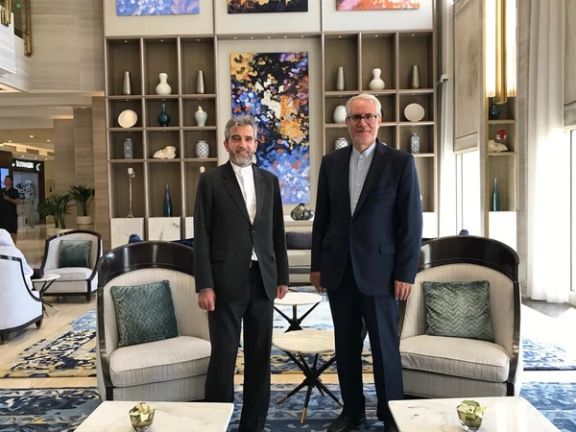
Iranian and United States lead negotiators were in Doha Tuesday as Qatar expressed hope that talks would “culminate in positive results that contribute to revival of JCPOA.”

Iranian and United States lead negotiators were in Doha Tuesday as Qatar expressed hope that talks would “culminate in positive results that contribute to revival of JCPOA.”
In a statement, the Qatari Foreign Ministry said the talks to revive the 2015 nuclear deal – the JCPOA, Joint Comprehensive Plan of Action – would be coordinated by the European Union.
Ali Bagheri-Kani, leading the Iranian delegation, arrived in Doha Tuesday morning. Welcoming him, Tehran’s ambassador Hamidreza Dehghani, tweeted, "Without any prejudice and expression of unrealistic pessimism or optimism, I wish them success in carrying out their important mission.”
United States special envoy Robert Malley met Tuesday with Qatar's Foreign Minister Mohammed bin Abdulrahman Al Thani. The US embassy said they discussed “the strong partnership and our joint diplomatic efforts to address issues with Iran.”
US National Security Advisor Jake Sullivan reiterated Monday that restoring the JCPOA was the best way to preclude any possible Iranian path to a nuclear weapon, and reiterated that Washington put the onus on Tehran to make the necessary moves. “There is a deal available on the table to Iran, and it’s up to Iran to decide whether or not it wants to take it,” Sullivan said.
Some analysts portray the talks – which, although US and Iran still talk indirectly, are separate to stalled Vienna talks between Iran and six world powers – as the last chance for Washington and Tehran to revive the JCPOA.

Iranian media and commentators have shown mixed reactions to the idea of holding the next session of nuclear negotiations in a Persian Gulf country, Qatar.
Hardline newspaper Kayhan on Monday carried a frontpage headline that said: "Negotiations in Qatar is a trap. We should not reward America."
Kayhan and its chief editor Hossein Shariatmadari are affiliated with the office of Supreme Leader Ali Khamenei.
The Kayhan wrote, "The venue of the negotiations is not the main issue. What matters is that we should not reward the United States for sending [EU Foreign Policy chief] Josep Borrell to Tehran and laying a diplomatic trap for Iran. We should not be overwhelmed and should not welcome the continuation of the negotiations, which means stepping back from our positions and our main condition."
After year-long talks in Vienna came to a standstill in March, it became apparent that Tehran was insisting on the removal of its Revolutionary Guard from the US list of Foreign Terrorist Organizations.
Meanwhile, many Iranians on social media noted that Borrel simply used the term Gulf when speaking about the venue of the talks, a sensitive issue for Iranians who reject a habit by international media and politicians to call the Persian Gulf, simply “Gulf”, or “Arabian Gulf” in rare cases.
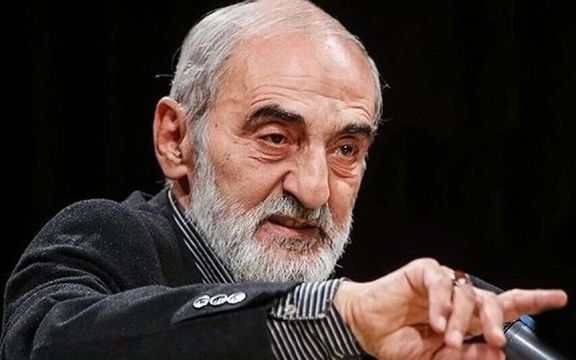
It also listed several headlines from US and regional media that said the US ‘maximum pressure’ policy has failed and Iran's position has been strengthening during the past months. The Kayhan insisted that "Iran is powerful" and then asked: "Why should we need negotiation with the evil and criminal West?"
Kayhan also expressed concern that "negotiating in the region might undermine the interests of Russia and China, the two countries that have voted against the IAEA Board of Governor's resolution against Iran." The daily then called on Iranian diplomats to insist on the lifting of all sanctions against Iran, to verify US measures and demand guarantees from Washington."
Meanwhile in an interview with the reformist Arman Emrooz newspaper, former diplomat Jalal Sadatian warned that Iran should not be optimistic toward the upcoming round of negotiations although it looks like that the meeting in Qatar is going to have a more serious approach to the nuclear issue than the ones in Vienna.
Nonetheless, he was not optimistic about the upcoming talks as he believed that “Russia is still against an agreement” and that is why Moscow sent Foreign Minister Lavrov to Tehran shortly before Borrell's visit
Foreign relations analyst and former lawmaker Ahmad Bakhshayesh told Arman Emrooz that the West has realized pressures on Iran has brought it closer to te East (China) where it is selling its oil. He added that under pressure from the energy implications of the war in Ukraine, the West is trying to embrace Iran once again before the next winter.
Bakhshayesh echoed what Sadatian also said that Iranian and US negotiators will talk face to face without any need for mediators. However, he did not explain why he thinks so. He added that Russia has the upper hand in Ukraine and the West needs to find a replacement for the oil from Russia and Iran seems to be the best possible replacement.
Meanwhile, foreign policy analyst Diako Hosseini said in an interview with ILNA that both Iran and the United States see the JCPOA as serving their interests and if talks resume, this would be the last round and an agreement will be at hand.
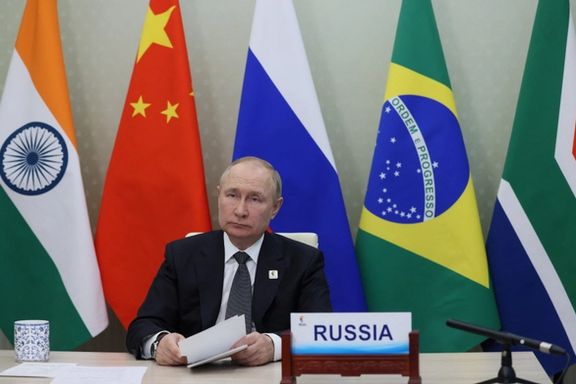
Iran has applied to become a member in the group of emerging economies known as the BRICS, Russia and Iran’s foreign ministry said on Monday.
Iran's membership in the BRICS group, which includes Brazil, Russia, India, China and South Africa, "would result in added values for both sides," Iran's Foreign Ministry spokesperson said.
Russian Foreign Ministry spokeswoman Maria Zakharova said separately that Argentina had also applied to join the group. Argentinian officials could not be reached for immediate comment.
Argentina's President Alberto Fernandez, currently in Europe, has in recent days reiterated his desire for Argentina to join BRICS.
"While the White House was thinking about what else to turn off in the world, ban or spoil, Argentina and Iran applied to join the BRICS," Zakharova wrote on the Telegram messaging app.
Both Iran and Russia are under wide-ranging international and US sanctions, looking for ways to expand trading ties to survive export bans.
Russia has long been pushing to forge closer ties with Asia, South America and the Middle East, but it has intensified its efforts recently to weather sanctions imposed by Europe, the United States and other countries over its invasion on Ukraine.
Iran has long espoused closer ties with “the East”, meaning China and Russia as it has continued nuclear and ballistic missile programs seen as threats by the United States and several regional countries.
The BRICS is not a formal alliance, but a nascent international grouping intended to expand the power of emerging economies in larger international organizations such as the International Monetary Fund and the World Bank.

Iran’s foreign minister has traveled to Turkey to bolster ties with Ankara amid Israel’s repeated warnings about terror plots by the Revolutionary Guard against Israeli citizens there.
Hossein Amir-Abdollahian held a joint press conference with his Turkish counterpart Mevlüt Çavuşoğlu before he held a meeting with President Recep Tayyip Erdoğan on Monday.
Amir-Abdollahian, whose plans to visit Ankara had earlier been cancelled twice because of IRGC's plot to harm Israelis in Turkey, said during the presser that, “We consider the fake Israeli regime as the number one enemy of Muslims and the Islamic world.”
Earlier in June, Turkey reportedly warned the Islamic Republic against attacking Israelis in Turkey, saying it is not prepared to allow Iran to use its territory to carry out acts of terrorism against other nations.
According to Iran’s top diplomat, the EU's foreign policy chief’s recent trip to Iran was also discussed with his Turkish counterpart. “I briefed my brother Mr. Cavusoglu on the visit to Tehran by Mr. Josep Borrell... and our agreement to continue negotiations on the removal of sanctions. We hope that in the new round of the negotiations between Iran and the other parties we will achieve a final agreement, if the United States and three European countries act realistically.”
He told reporters that Tehran would not oppose a new proposed Turkish military operation targeting Kurdish forces in Syria, saying that “We understand Turkey’s security concerns very well.”
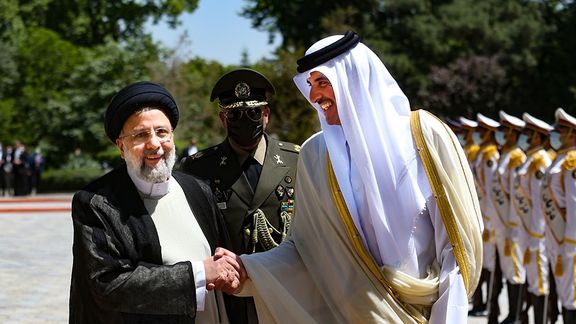
Iran’s Tasnim news reported Monday that lead negotiator Ali Bagheri Kani was heading to Doha Tuesday for indirect talks with the US over the 2015 nuclear deal.
This came with expectations firming of indirect United States-Iran talks over restoring the agreement – the JCPOA, Joint Comprehensive Plan of Action – but with no indication of how gaps would be bridged.
“Resuming negotiations doesn’t mean we’re closer to agreement,” Mohammad Marandi, advisor to Iran’s nuclear negotiators and a de facto spokesman, told media outlets in Tehran. “America hasn’t yet taken the necessary decisions.”
Saeed Khatibzadeh, foreign ministry spokesman, said Monday Iran would “wait and see if the Americans will part with Trump’s legacy and if Borrell’s messages become a reality.”
In visiting Iran, Josep Borrell, the European Union foreign policy chief, announced Saturday that Iran and the US had agreed to renew contacts. Year-long talks in Vienna over reviving the 2015 deal, abandoned by President Donald Trump 2018, paused in March with a draft text largely agreed but with outstanding questions left for the US and Iran to resolve.
The Iranian media has reported that new indirect talks between the US and Iran will take place in Doha, Qatar, with EU representatives acting as go-betweens. In Vienna, formal talks involved all remaining JCPOA participants – China, France, Germany, Iran, Russia, and the United Kingdom – with US negotiators based in a separate hotel.
There have been suggestions in recent months that Qatar has tried to mediate. Talks between the US and Iran leading up to the 2015 deal – the JCPOA (Joint Comprehensive Plan of Action) – took place in Oman.
US officials have confirmed to American media outlets that Washington has agreed to a new round of talks, but have also been suggested their expectations were low.
The greatest obstacles in the Vienna talks centered on reaching agreement over which US sanctions contravened the JCPOA, which ruled out “discriminatory regulatory and procedural requirements in lieu of the sanctions,” and exactly how Iran’s nuclear program, expanded incrementally since 2019, would be brought back within JCPOA limits.
Israeli ‘sabotage’
Tehran has specifically argued that some sanctions introduced by Trump under other rubrics, including ‘terrorism,’ were designed to stymie efforts to restore the JCPOA. Biden administration officials, although committed to restoring the deal, have accused Iran of thereby introducing demands not relevant to the JCPOA.
In recent days, there have been suggestions of some compromise over the US listing of Iran’s Revolutionary Guards, part of its armed forces, as a ‘foreign terrorist organization.’ While Tehran has requested this rescinded – it was done by Trump in 2019 – there has been criticism of such a proposed move by politicians in Washington.
Borrell’s apparent success in reviving the talks provoked a spat in Israel, with Defense Minister Benny Gantz taking to Twitter to dismiss reports that Israeli military intelligence chiefs favored restoring the JCPOA.
Politico reported Sunday that Israeli Foreign Minister Yair Lapid had told Borrell he was “very disappointed” with the EU foreign policy chief’s mission to Tehran, calling it a “strategic mistake that sends the wrong message to Iran.” Politico suggested Brussels in turn saw Lapid as trying to “sabotage the negotiations.”
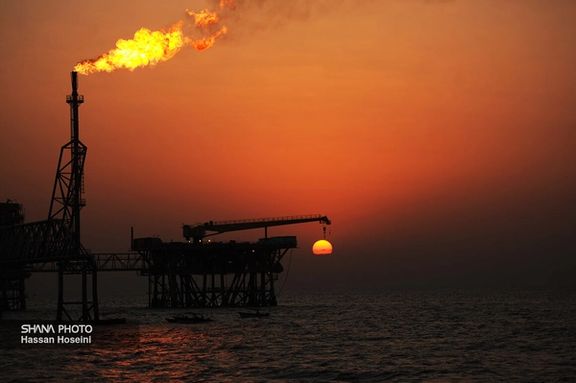
France has called for the return of sanctions-hit Iranian and Venezuelan crude to world markets to reduce the impact of declining Russian supplies on rising energy prices.
As Group of Seven (G7) leaders are discussing the viability of a price limit on Russian oil on the second day of their meeting at Schloss Elmau in the Bavarian Alps on Monday, a French presidency official said that France wants a planned mechanism to cap the price of oil to be as broad as possible and not be limited to Russian output.
While the leaders adopted a declaration pledging to support Ukrainian President Volodymyr Zelenskiy and his government “for as long as it takes,” Zelenskiy told G7 leaders that the conditions were not right to negotiate with Russia and wanted to be in a position of strength before began any negotiations.
On Sunday, France announced that G7 leaders will discuss the prospect of reviving the Iran nuclear talks after the European Union's foreign policy chief met senior officials in Tehran.
Discussions took place on Sunday at a dinner between the G7 leaders with more detailed talks scheduled for Tuesday morning between France, Britain, Germany and the United States.
The three European powers are parties to the nuclear deal, which then-US President Donald Trump pulled out of in 2018.
The pact appeared close to being revived in March after 11 months of talks, when the process came to a halt. Tehran insisted that Washington remove the Revolutionary Guard (IRGC) from the US Foreign Terrorist Organization list. Iran's indirect talks with the United States will resume soon in Qatar.